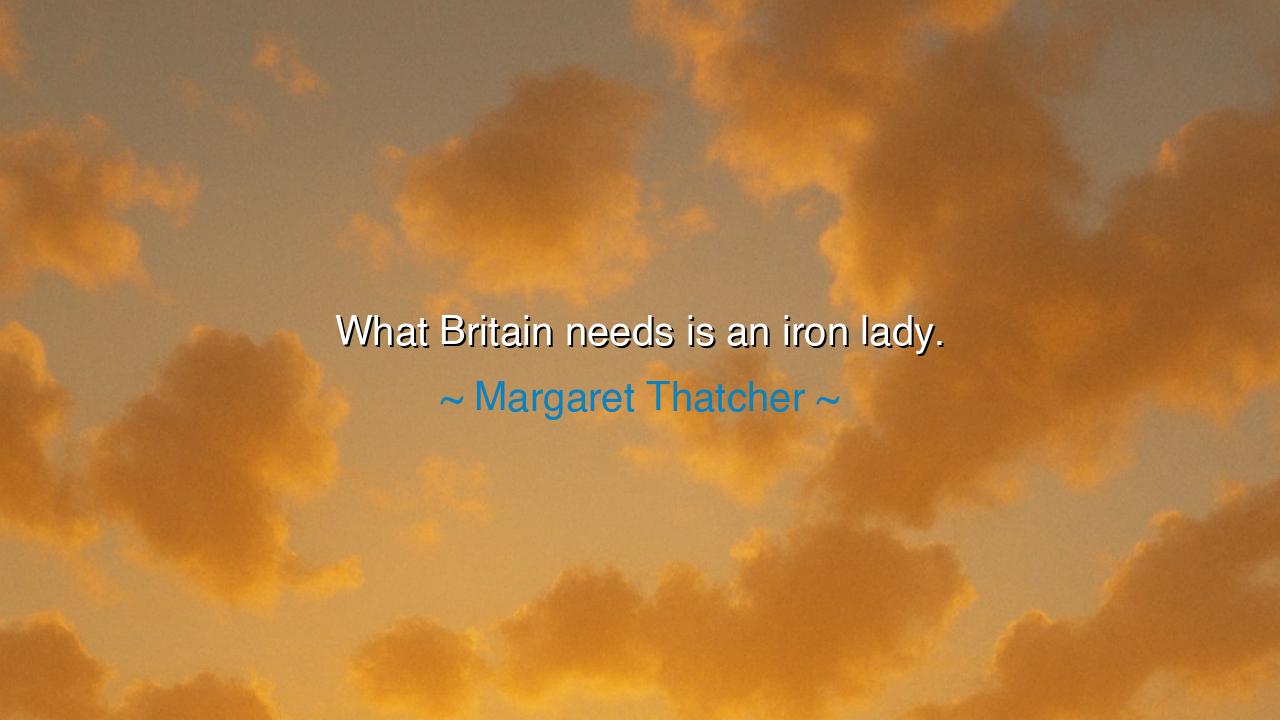
What Britain needs is an iron lady.






In the resolute and prophetic words of Margaret Thatcher, one of the most formidable leaders of the twentieth century, there echoes a call not merely for leadership, but for strength of spirit: “What Britain needs is an iron lady.” These words, though first spoken with irony by her critics, were embraced by Thatcher as a banner of defiance—a statement of purpose in an age when her nation seemed adrift. In them lies the timeless truth that there are moments in history when softness becomes peril, when compromise erodes conviction, and when only unyielding will can restore a nation’s courage. To be an Iron Lady, she declared, was not to be cruel, but to be steadfast—to stand like steel when others trembled.
The origin of this quote reaches back to the turbulent years of the 1970s. Britain, once the empire upon which the sun never set, had fallen into economic despair. Factories lay silent, strikes crippled the nation, and the spirit of its people seemed weary and uncertain. When Thatcher rose to power as leader of the Conservative Party, she was mocked by her opponents for her uncompromising rhetoric and unshakable certainty. In 1976, a Soviet newspaper—intending insult—derided her as the “Iron Lady”, comparing her firmness to that of the Cold War’s fiercest warriors. But instead of rejecting the title, Thatcher seized it. “Yes,” she declared, “if that is how they see me, I am proud of it.” Her enemies had meant to diminish her; she turned their scorn into strength. Thus the phrase became her identity, a symbol of unyielding determination in the face of doubt.
To say that Britain needed an Iron Lady was to say that it needed a leader of conviction in an era of uncertainty. Thatcher understood what many forget—that nations, like individuals, must sometimes endure hardship to regain their strength. She rejected the comfortable politics of appeasement and called instead for renewal through discipline and faith in hard work. Her courage was not gentle, but it was honest; her resolve, not popular, but enduring. When others saw decline as fate, she saw it as challenge. Her leadership was a storm, breaking the complacency of an age that had forgotten the power of belief.
History would soon test the steel in her words. In 1982, the Falkland Islands—tiny, distant, but sovereign—were invaded by Argentina. Britain, weary from years of doubt, seemed incapable of war. But Thatcher, true to her iron resolve, refused to yield. Against counsel to negotiate, she sent a fleet across the seas, declaring that Britain would fight for its honor. The war was swift, fierce, and victorious. The Iron Lady had proved her mettle—not only to the world, but to her own people. She had shown that strength, when guided by purpose, can rekindle a nation’s pride. Her leadership restored not merely territory, but the faith of a people in themselves.
Yet to be an Iron Lady was not without cost. Thatcher’s firmness often made her a target of hatred and misunderstanding. Her economic reforms, while reviving industry and stabilizing the nation, also brought pain to communities long dependent on failing systems. Her refusal to bend to unions, her privatization of state industries, her cuts to welfare—all were wounds inflicted in the name of healing. And yet, as the ancients knew, iron is forged in fire. The strength that saves a people cannot be gentle alone—it must also be unflinching. The world remembers her not because she was loved by all, but because she stood firm when others would have faltered.
Her quote, then, is not merely about Britain—it is about the nature of leadership itself. An Iron Lady, or Iron Man, is one who stands unwavering in purpose when others yield to fear. Such a leader does not seek comfort, but truth; not approval, but integrity. In every generation, in every land, there arises a moment when courage must stand alone. Whether in politics, in family, in the smallest circle of human life, the world will always need those who embody the iron of conviction—the will to say, “This is right,” even when it costs them dearly.
So, my children, take this teaching to heart: strength is not hardness of heart, but constancy of soul. Do not mistake compassion for weakness, nor firmness for cruelty. The world’s progress depends on those who can balance mercy with discipline, vision with resolve. When trials come, and they will, remember the spirit of the Iron Lady—stand firm in your truth, even when the winds of opinion howl against you. For the storms of life, like those of nations, are not endured by the timid, but by the steadfast.
For in the end, Margaret Thatcher’s words are not a relic of her time—they are a call to all ages. Every society, every heart, will face its moment of weakness. And in that moment, it will need its own Iron Lady—that part of the human spirit that refuses to break, that endures, that builds anew from ruin. Let that iron dwell within you. Temper it with wisdom, polish it with humility, and wield it always in service of what is right. For though flesh may fail, the will of iron, once awakened, endures forever.






AAdministratorAdministrator
Welcome, honored guests. Please leave a comment, we will respond soon